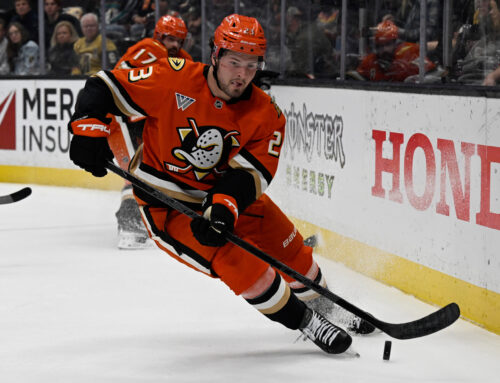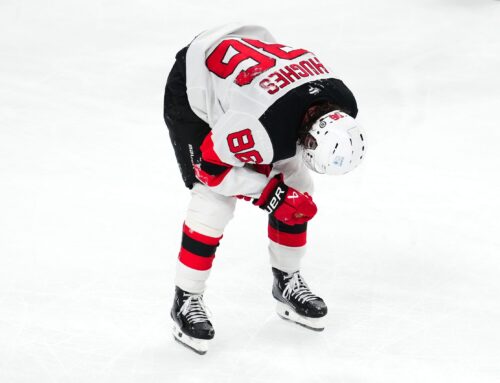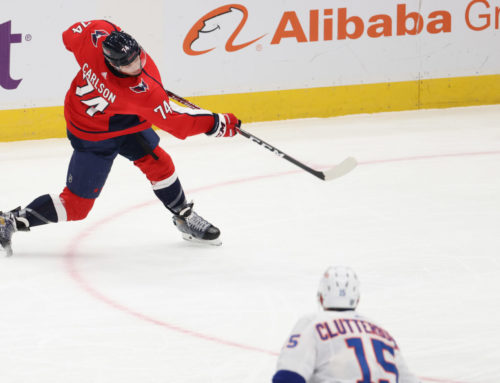Surgery for Kris Letang; Kyle Okposo out; Evander Kane’s season; Kyle Palmieri’s production.
****
Word came down on Wednesday that after suffering a setback in his rehab, Kris Letang would undergo neck surgery for a herniated disc. The expected recovery time is four to six months. That timeline should have him ready for the start of the 2017-18 season. I would hesitate on setting that in stone, however, and wait to see progress updates as the summer wears on. For Dobber’s fantasy slant on the injury, check out what he wrote yesterday.
I just want to add a bit to Dobber’s take and look further down the line than the rest of this season, however long it may be for the Pens.
There was a time when Letang was a second-round pick. Then a third-round pick. This year, he was likely a fourth-round pick (assuming 12 teams). This season was Letang’s ninth 82-game season in the NHL, and he’s played 75 games in one of them. Fantasy owners have caught on, and his draft position will slide even further next year.
That his draft position will slide well outside the top-50. Assuming we hear good news all summer, I would be willing to spend a sixth or seventh round pick on him. The hope would be to get 65 good games out of him, and fill the rest in with the waiver wire. Regardless, it’s definitely something to keep a close eye on over the next several months.
****
During last night’s game, the Buffalo Sabres released the following statement:
Statement regarding Sabres forward Kyle Okposo. pic.twitter.com/oUGXhy3gmX
— Buffalo Sabres (@BuffaloSabres) April 6, 2017
That sounds kind of scary. Teams don’t put out press releases for a guy with the flu, or even the mumps, that I recall anyway. The most information looks to be available from the Buffalo News, and can be read here.
Keep an eye out for further updates, and best wishes to Kyle.
****
With the end of the season this week, it is important for some reflection on the fantasy season that was. Identifying what went right and what went wrong should be a process that every fantasy owner goes through. Reviewing results can help find flaw in the processes, which can help sharpen future projections and predictions. Sometimes the results aren’t indicative of anything that good/bad luck (like an injury), so be careful when focusing too much on what happened. The ‘why’ is as important as the ‘what.’
I thought I would share a handful of players I wasn’t high targeting going into the season that ended up with solid fantasy campaigns. I will explain my reasoning for not being high on them, and the reason why my projections failed.
Auston Matthews
This is a big, big miss. Depending on individual league settings, Matthews is anywhere from a top-25 to top-50 fantasy option this year. Depending on the league, he was probably drafted somewhere around the top-100, possibly the top-125 (much earlier in keeper/dynasty leagues, obviously, but the focus is one-year leagues).
Reason for avoiding: I was concerned about two things: ice time, and opportunity cost.
With regards to the former, I thought this would still be looked at as a rebuilding year in Toronto, and that would mean more minutes for Nazem Kadri and Tyler Bozak. The thought process was that Matthews would be looked at as more as a “third-line” center, in the sense that he would be third on the depth chart for minutes among centers. Well, he leads all Leafs forwards in time on ice per game, earning about a minute more than Kadri, and 1:15 than Bozak. The rookie has definitely earned that ice time with his play, I just didn’t think it would happen this year.
As for the latter, I saw other players like Jeff Carter and Matt Duchene being drafted around his pre-season rankings. When there are opportunities to draft established players like this in fantasy leagues, I almost always lean with the veterans over the rookies. That was clearly a mistake here.
To sum it all up, I thought Matthews would be a good player, and he’s looking every bit the generational talent right out of the gate. If his current rate holds, he’ll be the first rookie since 2005-06 to average 3.4 shots per game, he’s sixth among all NHL forwards in shots per minute at five-on-five this year, and via Corsica Hockey, he leads all NHL forwards in individual scoring chances per minute, which can be seen in the graphic below:
.png)
It’s flat-out been one of the greatest rookie seasons in modern NHL history.
Sure, he almost certainly won’t crack 50 points, but he has a shot at 30 goals, and that’s pretty valuable in fantasy. He was basically an after-thought in a lot of drafts, and looks to be in line to finish as a top-100 fantasy option (again, depending on league settings).
Reason for avoiding: It basically boils down to shot selection.
Each of the last two seasons saw Kane take his average five-on-five shot from over 32 feet away, again from Corsica. In fact, among all NHL forwards, Kane had the 12th-longest average shot distance from 2014-2016. Among those 12 forwards, twice as many had a shooting percentage under 6 percent as over 10 percent (Kane was 6.14). Shooting from that far away makes it hard to score consistently, even with his shot volume. Shot distance data should be taken with a grain of salt, as the NHL is notorious for being… let’s say inconsistent with their stat tracking.
Something changed this year. His average shot distance plummeted to 28.4 feet, while his shooting percentage climbed over 10 percent. It was also the first time in three years he posted an individual scoring chance rate of over three per 60 minutes, something he was more known for earlier in his career. Even though his shot rate was somewhat stable from previous seasons, the quality of those shots improved, and we’re seeing the results in his goal total.
Figuring out why he improved so much in his average shot distance is the next step, because it was the first time since his 30-goal campaign in 2011-12 that he finished under 30 feet. That is for another day, but it’ll be crucial to figuring out whether this season is an aberration from an established norm, or the beginning of a new norm.
The 2015-16 season saw Palmieri break out for 30 goals and 57 points. That’s a very good season for most players, let alone ones that played for the worst offensive team in the league. While he didn’t exactly replicate that this year, 25 goals and 51 points (so far) is a pretty good follow-up year playing for the second-worst offensive team in the league.
Reason for avoiding: He plays for New Jersey.
Ok that may be a bit simplistic, but that was the gist of it. Anyone expecting the Devils to turn into some top offensive team – or even a middling offensive team – just because of the acquisition of Taylor Hall was misguided. What I did not anticipate was Palmieri playing about half of the season on Hall’s line.
When Palmieri was on the ice with Hall this year, the Devils scored 2.5 goals per 60 minutes at five-on-five. Last year, when Hall was still Edmonton, New Jersey averaged 1.8 goals per 60 minutes with Palmieri was on the ice. That was an impossibly low number, so maybe a rebound was due regardless, but there’s no doubt how much Hall has helped that team offensively. It should be noted that Palmieri also had a very good goal-scoring rate with Michael Cammalleri on his other wing, though they played significantly fewer minutes together.
This is now back-to-back seasons of very good production from Palmieri on a team that is abysmal in the offensive zone. He’s done it both with, and without, Hall on his wing. Going back four seasons now, his goals per 60 minutes at five-on-five is tied for 43rd out of 324 forwards with at least 2000 minutes played. His rate (0.86) is slightly higher than notable names like Patric Hornqvist (0.82), Jaden Schwartz (0.81), and Jeff Carter (0.80). Anything can happen in a single season, but he looks like a perennial 25-goal scorer now.
Over the previous five 82-game seasons, Keith had managed more than 45 points once (he had 61 the year he won the Norris Trophy). This year, he’s at 51 and counting. If you’re in a league that counts plus/minus, well, he’s crushing there with a plus-22. He’s also averaging the third-highest shot-per-game rate of his career at 2.3. The power-play points haven’t been plentiful, but 15 is nothing to sneeze at. In a standard ESPN league, he’s a top-10 defenceman.
Reason for avoiding: Lack of peripheral stats would leave him overvalued in roto leagues.
That plus/minus is killing me. I know it’s a useless stat in real hockey, but there are still fantasy leagues that use it. The save percentage of Chicago goaltending at five-on-five with Keith on the ice is .939. It had been .930 in each of the last two seasons, but that .939 is a career-high for him. That is a big reason for that healthy plus-22 rating.
His shot rate on the power-play shot up from last year. The 2015-16 season saw him land just 7.5 shots per 60 minutes with the man advantage, and that rose significantly to 11.0 this year. The healthy season meant a lot more games, and more games with more power-play shots has led to him managing at least 180 shots on goal for just the third time in his career.
The 45 assists Keith has amassed so far is also the third-highest of his career, and just the third time he’s managed at least 40. While some of those extra assists have come at five-on-five, it’s actually the other even strengths where the rest of the difference is accumulated. This year, he has three assists at three-on-three (he had one last year), and two assists at four-on-four (he had none last year). Small advantages, but advantages that have helped make him a top-10 defenceman.
Whether he can manage five or six extra assists at the other even strengths next year, stay healthy, and keep up the shot pace on the power play is a question for another Ramblings. He did it this year, and it made him a more valuable roto commodity than I thought he would be.
One Comment
Leave A Comment
You must be logged in to post a comment.





 ANA
ANA TOR
TOR CAR
CAR VAN
VAN PIT
PIT MIN
MIN S.J
S.J NYR
NYR

Congrats to Holtby for his 9th shut-out and 42nd win this season!